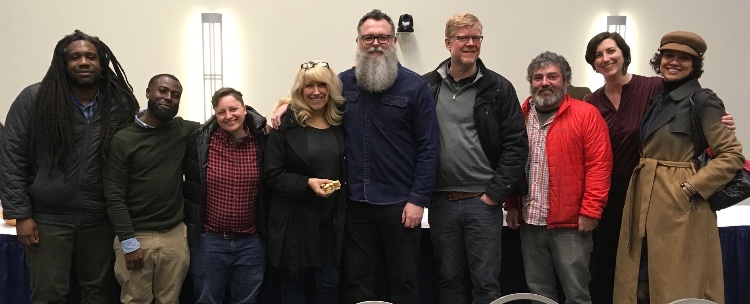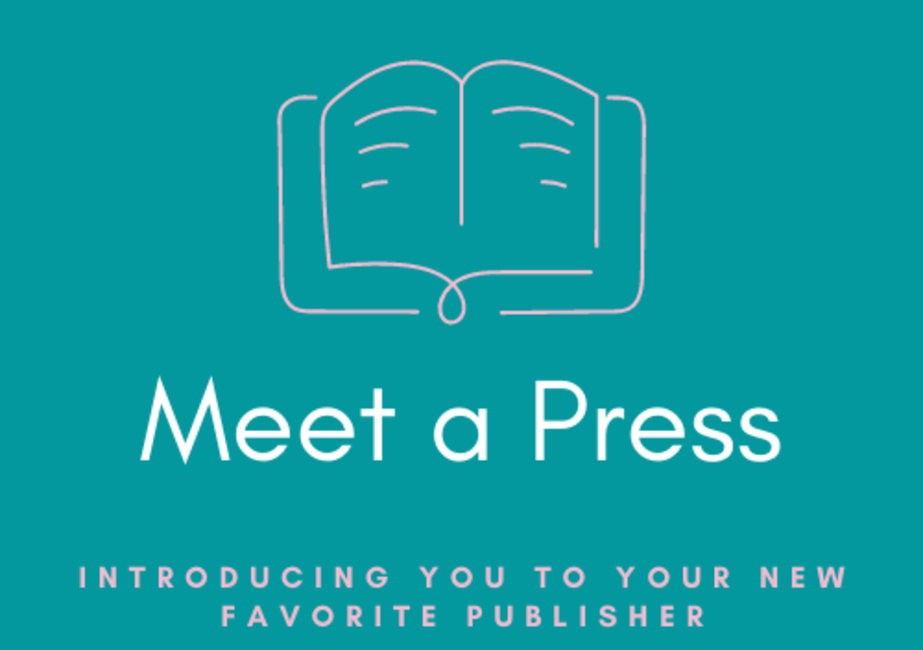As an independent press, we love to help support other small and indie presses who, like us, work in their community by providing a space and a voice for local readers and writers. In our new blog series "Meet a Press," we thought we'd reach out to some of our friends in the local publishing business to get to know them a little bit better, see what they're up to, and share their work, and books, with you!
Next up is West Virginia University Press, the only university press in West Virginia! Check out our interview with Derek Krissoff!

Could you tell us an anecdote that captures the spirit of West Virginia University Press?
The day we published Appalachian Reckoning—our collection of essays responding to Hillbilly Elegy, which amplifies perspectives on the region from activists, writers of color, and members of the LGBTQ community—it got a New York Times review (our first!) in the morning and then that evening it had a standing-room-only launch event in Morgantown. That mix of national attention and place-based celebration, all in the same day, felt like a distillation of what we do at West Virginia University Press. I don't think of our work as regional publishing, exactly, but as a commitment to shaping global conversations from a rooted place that's often underserved by traditional publishers.

Pittsburgh is the closest big city to Morgantown, and the two places have a lot in common, from steep terrain to postindustrial challenges to cultural similarities in things like accents and foodways. (I first noticed elements of the classic Pittsburgh Yinzer accent in my daughter's speech when she was in middle school in Morgantown.) One of Pittsburgh's three rivers is the Monongahela, which connects us to Morgantown, and that sense of flow—of people and ideas and yes, books—strikes me as characteristic of Appalachia. It's a more open and dynamic place than a lot of people give it credit for. The bookstores and local media here in Pittsburgh have been excited to champion WVU Press's books and authors, and we've helped bring our Pittsburgh authors to WVU for events, as well.
What jumps out at you when you are looking at submissions?
My roots are in fairly traditional scholarly publishing, I've spent a lot of time with professors, and I've never imagined scholars or other university-based authors as necessarily walled off from a general readership. So when I think our press can help connect university folks to the wider world, I get excited. I like books that jumble expectations, too—collections with multiple authors, books that mix graphics and text (like Marked, Unmarked, Remembered or So Much to Be Angry About), books that reassemble different kinds of material (like our edition of Muriel Rukeyser's poetry cycle The Book of the Dead, which includes a long narrative essay), and so on. Because we're small—and because the charge to innovate is in our mission—I think we can take chances on books that don't fit into obvious slots for big commercial houses.
How would you describe a university press's place in the publishing world?
I think the world is a more fun and varied place—and universities are more public-facing and engaged—when university press publishers around the country are meaningfully shaping book culture. Obviously, the commercial houses in New York have certain advantages, and they do a great job. I read a lot of their books. But there are advantages to being here in the interior, too—to having conversations that might not happen in New York, to being encouraged to take mission-based risks, etc. Many of us are attached to universities with great creative writing MFA programs or academic departments that have, say, leading historians or literary critics. We may be tapped into activist communities that fly under the coastal radar. We’re living and working in places where it’s easier to make a living on a publishing salary. And so on. Sometimes university presses get talked about in terms of circulating content, but we’re publishing real books—often working in networks of indie collaborators including booksellers and local media—and doing it well.
Looking to the future, how do you see your impact growing or changing?
Having our most successful year ever during a world-historical public health crisis has been an interesting confluence, and I think it'll take a while for my colleagues and me to sort through the lessons. At the end of the day, though, books are almost comically resilient. In 23 years of doing this work, the predictions of seismic change have been near-constant, but most of what's shifted (the rise in short-run digital printing and of social media, for instance) has helped traditional books more than hurt them. That doesn't mean things are static, but it does mean that my colleagues and I will continue to bet on the side of books.
The Secret Lives of Church Ladies has blown up! Tell us about the book's reception and what that exciting process has been like.
When Deesha's book was named to the longlist for the National Book Awards I was stunned and a little terrified. That was in the early leadup to the holidays, and logistical things were gummed up from covid, and it was sometimes hard keeping even normal successes in stock. So the first order of business was “make sure people can get the book” (which meant, unfortunately, losing the flaps on the paperback, since they caused restocks to take much longer at the printer).
I’m a bit of a twitter addict and I didn’t even tweet about the NBA longlist from my personal account until a day or two after it was announced—things were just too surreal in the immediate aftermath. But then Deesha did so well in the various NBA ceremonies and events (and the folks at the National Book Foundation put us all at ease), and it all started to feel more normal. In the many instances since then when there’ve been positive developments around the book, I’ve tried to approach good news in a more deliberate way—looking for opportunities not just to help elevate Deesha and her book, but to make points about university press success. We have an extraordinarily successful title this year but other university presses have had them before and others will have them in the future.
Your publications cover a wide range of topics and genres. What are your upcoming projects focusing on?
There's so much in the pipeline and I don't want to play favorites! I will say that in the flurry of acquisitions activity so far this year, Jessica Wilkerson's A Women's History of Appalachia feels like a standout, in part because the author is at West Virginia University. Of books in the spring catalog (which we're just starting to assemble now), I'll put in a plug for Neema Avashia's memoir-in-essays about growing up queer and Indian American in West Virginia, which will be out in March.
Okay, Lightning Round!
Coffee or tea?
Coffee.
Hardback or paperback?
Paper.
Pencil or pen?
Pen.
Chocolate or vanilla?
Chocolate.
Bookstore dog or bookstore cat (we are biased)?
Allergic to cats!
Keep it clean or mark up a book?
I'm a former grad student—so, mark them up.
Mountains or beach?
I think I have to say mountains? But I mean it!
Read outdoors or indoors?
Indoors—but indoors in the mountains.


